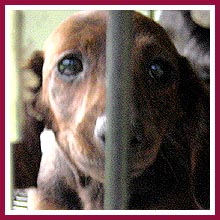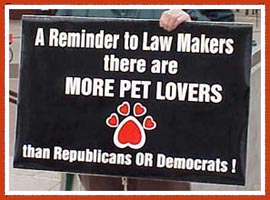|
 When
Eilene Ribbens purchased a pet store Dalmatian puppy “out of pity” in
1998, she had no idea that their relationship would completely change her life
-- and also help thousands of other dogs in Wisconsin. When
Eilene Ribbens purchased a pet store Dalmatian puppy “out of pity” in
1998, she had no idea that their relationship would completely change her life
-- and also help thousands of other dogs in Wisconsin.
At
that time, Ribbens knew very little about puppy mill dogs. She simply felt
compelled to rescue Mr. Peabody, a sad little pup living in a glass box in a
local mall. However, as soon as she took the pup home, she realized that he
came with some major problems along with the AKC purebred “papers”
the pet shop provided.
Peabody
had significant health and behavioral challenges. When Ribbens took the dog for
veterinary care and behavioral training, she discovered that "papers"
do not guarantee a healthy puppy nor do they insure the proper care of the
adult dogs that produced the puppy.
Most
of Mr. Peabody's issues were permanent and could not be fixed.
Ribbens was certain that laws had been violated. She wanted justice for herself
and her dog so she contacted Dr. Yvonne Bellay, the State Humane Agent and
Veterinarian with the Wisconsin Department of Agriculture, Trade and Consumer
Protection (DATCP).
To
her shock, Dr. Bellay said, "You’re in a bad situation. I get these
calls every week. Wisconsin does not regulate dog sellers or breeders. No laws
exist so no laws have been violated. Besides our very basic animal cruelty
statute, there is nothing in the current law to protect you or your dog."
 Dr. Bellay went on to
explain that citizen action and a strong appeal to legislators were needed. She
warned that such an effort could take ten years, perhaps longer. She said the
process would require someone who was willing to take on the task and stick
with it. Dr. Bellay went on to
explain that citizen action and a strong appeal to legislators were needed. She
warned that such an effort could take ten years, perhaps longer. She said the
process would require someone who was willing to take on the task and stick
with it.
After
much thoughtful consideration, Ribbens decided she was that someone. She would
pursue citizen action for state legislation regulating dog breeders and sellers
– and for a more humane Wisconsin. In 1999 she established the Wisconsin
Puppy Mill Project (WPMP), a grass roots movement in its purest form. The
organization was granted non-profit status in 2004 and quickly gained support
from other advocates, pet owners, humane organizations, lawmakers, the media
and quality hobby dog
breeders.
The
legislative process did take over ten years as Dr.
Bellay had predicted, with many starts, stops, and bumps in the path along the
way.
"There
were times we all just felt like giving up," Ribbens said.
"Everything was so extremely difficult and painfully slow. We endured many
disappointments." She claims it was her Dutch and Norwegian upbringing
that kept her leading the effort. "The Dutch are persistent and the
Norwegians are stubborn," she says with a grin.
By
2007, dog auctions were established in
Thorp, Wisconsin, and the practice of mass-producing dogs in substandard
settings was exploding at an alarming rate. RIbbens saw the lack of regulation
as a welcome mat for "bottom feeder breeders" to set up shabby
operations in Wisconsin.
Ribbens
dialed up her efforts. The media’s enthusiastic response to her request to
help expose the situation resulted in significant opportunities to educate the
public and enlist lawmaker support. One of those lawmakers was Wisconsin State
Representative Jeff Smith, whom WPMP organizers persuaded to attend a dog
auction and visit a puppy mill.
 Representative Smith
was appalled by what he saw. He authored legislation that passed unanimously in
the Wisconsin Senate and Assembly. Act 90/s.173.41, the
WI Dog Seller Program was signed into law. After an exhaustive
Administrative Rules process to
establish acceptable standards of care, the law went into effect. It regulates
Wisconsin dog breeders and sellers including rescues, shelters, and animal
control facilities, under a licensing and inspection program administered by
the
Department of Agriculture, Trade and Consumer Protection
and managed by Dr. Bellay. Representative Smith
was appalled by what he saw. He authored legislation that passed unanimously in
the Wisconsin Senate and Assembly. Act 90/s.173.41, the
WI Dog Seller Program was signed into law. After an exhaustive
Administrative Rules process to
establish acceptable standards of care, the law went into effect. It regulates
Wisconsin dog breeders and sellers including rescues, shelters, and animal
control facilities, under a licensing and inspection program administered by
the
Department of Agriculture, Trade and Consumer Protection
and managed by Dr. Bellay.
Has
all this effort ended puppy mills in Wisconsin? While significant and dramatic
improvement has taken place under the Act 90 licensing and inspection program
-- including the closure of some of the state's most notorious
"mills" -- the process is on-going, and the public's help is needed.
If you have
reason to suspect that any unlicensed breeder is selling more than 25 dogs a
year, or are concerned about the conditions in which a a breeder/ seller/
shelter/ stray hold facility is keeping dogs, PLEASE see our
Filing a Complaint page for information on
how to contact DATCP with your concerns! Remember that it is vitally important
to provide investigators with as much detail and documentation as possible:
dates, times, locations, contacts -- phone numbers, email, texts etc. -- and a
"screen shot" if possible of ads on Craig's list or Facebook. All
complaints will be investigated. With the public's help, DATCP has been able to
help prosecute at least one notorious breeder who went "underground"
to avoid upgrading her facilities in compliance with the Dog Breeders and
Sellers Law.
"The
things I know and see sometimes keep me up at night," Ribbens says.
“The struggle to get the ‘puppy mill bill’ passed now seems easy
compared to the on-going responsibility to educate and clean up the mess that
was years in the making."
"Wisconsin
is a big state with many rural and hidden places. Puppy mill style operations
and other egregious forms of animal abuse and neglect still exist and must be
rooted out, reported and remediated through determined actions and meaningful
legislation. There are so many humane issues that demand our time and
resources," Ribbens added.
To
that end the Wisconsin Puppy Mill Project maintains an extensive website, both
for educational and advocacy purposes. "Networking is critical," said
Ribbens, "and we no longer limit our efforts to dogs." In addition to
helping ferret out “underground” and other abusive pet dealers, the
Wisconsin Puppy Mill Project also supports animal shelter veterinary services,
spay and neuter programs, and assistance to animals in need.
 Currently the
organization is campaigning for regulation of exotic species as pets, safer
public lands for people and animals, protection of wild species, and promoting
humane standards for the use of hunting hounds. Ribbens also advises other
advocates on local, state, and national humane issues. Currently the
organization is campaigning for regulation of exotic species as pets, safer
public lands for people and animals, protection of wild species, and promoting
humane standards for the use of hunting hounds. Ribbens also advises other
advocates on local, state, and national humane issues.
Does
she oppose all dog breeding? “No,” says Ribbens, "Humane
societies, animal shelters and rescue groups offer wonderful pets and
phenomenal services, and I will always encourage adoption and rescue as the
primary source for acquiring a pet. However, people should have the choice of
including an adorable, well-bred, happy, healthy puppy in their lives. There
are many quality, caring hobby breeders in Wisconsin who truly care about the
dogs they create. They raise them in home settings, place them carefully, and
form a relationship with the people who take them home.”
Happy,
healthy pets in good homes and a more humane culture -- that is what the
Wisconsin Puppy Mill Project is all about.
|